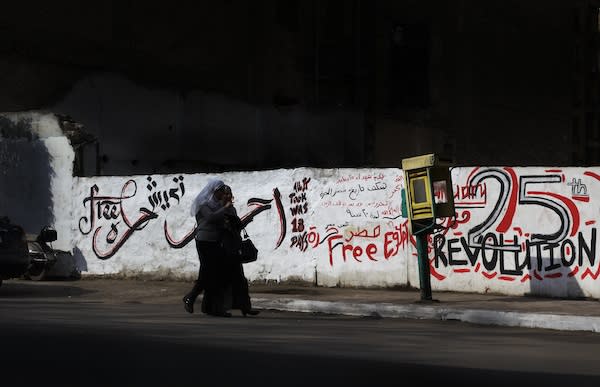 The Cutline
The CutlineHow social media sparked Tunisian, Egyptian revolts

The fall of autocratic regimes in Tunisia and Egypt has shown to the world how activists can harness social media to organize and share information amid police crackdowns and state media censorship.
But the two revolutions, which played out quickly in front of cameras on the streets of Tunis and Cairo, weren't simply the result of tweets and Facebook updates over the past month. Rather, they've been germinating online for years. The New York Times looks today at how Internet activists living under repressive Arab governments collaborated online and helped foster "a pan-Arab youth movement dedicated to spreading democracy in a region without it."
Times reporters David D. Kirkpatrick and David E. Sanger note that the Egyptian uprising has been "years in the making," with bloggers calling attention to injustices under Mubarak since at least 2008. In addition to the vocal anti-Mubarak blogosphere, Internet activists launched a Facebook group, the April 6 Youth Movement, that helped promote a general strike on that day in 2008. Although the strike didn't play out as activists hoped, it did end up serving as a vital organizing tool.
Tunisian activists followed the Egyptian model and set up a Facebook group of their own, the Progressive Youth of Tunisia. And during the Egyptian protests, Tunisian activists--fresh from combating police beatings and tear gas during their own revolt--shared tips and strategy with fellow Arabs fighting against a repressive government.
And the online focus of much of this work meant organizing efforts weren't confined to any one country's borders. Egyptian expatriates also started a group online from Qatar (Academy for Change), while Wael Ghonim—a 30-year-old Google marketing executive who has become a symbol of the youth movement—started an influential Facebook group over a year ago named after an activist killed by the police: "We Are All Khalid Said." Egyptians exchanged ideas, information, and stories of police beatings that kept the protest movement simmering online before its followers hit the streets.
Following the Tunisian revolution, the April 6 Youth Movement used its Facebook group to mobilize protesters for a massive demonstration on Jan. 25. That event wound up launching 18 days of protests that toppled a regime and captivated the world.
Ghonim has consistently stressed the importance of social media and the Internet to the protest movement in media interviews in the wake of his release from custody in Egypt. Last night on "60 Minutes" he said that without Facebook, Twitter, YouTube and Google, the revolution "would have never been sparked."
You can watch Ghonim's interview below:
(Photo of newly painted murals near Tahrir Square in Cairo, Egypt on Feb. 13, 2011: Ben Curtis/AP)
